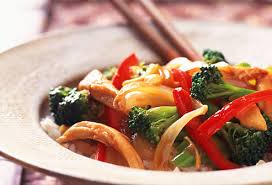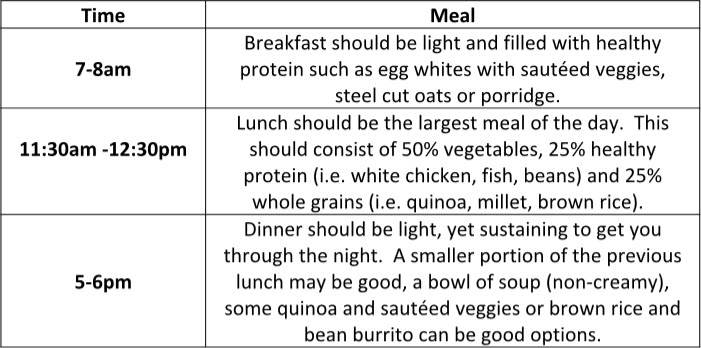 Since Kapha is the main dosha that is increased with excessive weight, the dietary regimen must focus on decreasing this imbalance (heaviness, adipose tissue, toxins, congestion, etc). This natural diet plan has been designed to reduce weight while increasing one’s digestion, energy, vitality and overall health. Please remember that you have to work gently without overwhelming the body or mind. Chose a handful of these to work with to begin and in a week or two, add on a few more recommendations to the diet plan. Be compassionate to yourself during this time, yet remain focused, dedicated and self-disciplined. Being consistent with this diet plan is the only way to get long-term weight loss results.
Since Kapha is the main dosha that is increased with excessive weight, the dietary regimen must focus on decreasing this imbalance (heaviness, adipose tissue, toxins, congestion, etc). This natural diet plan has been designed to reduce weight while increasing one’s digestion, energy, vitality and overall health. Please remember that you have to work gently without overwhelming the body or mind. Chose a handful of these to work with to begin and in a week or two, add on a few more recommendations to the diet plan. Be compassionate to yourself during this time, yet remain focused, dedicated and self-disciplined. Being consistent with this diet plan is the only way to get long-term weight loss results.
General Meal Plan for Weight Loss
Dietary Recommendations for Weight Loss
1. Do not snack between meals.
It is vital to let one meal digest fully before the intake of anymore food. When the digestion is low, snacking in between meals will decrease the metabolism, lead to further weight gain, create toxic build-up in the system and wear down the pancreas (leading to insulin resistance).
2. Do not eat after 6pm.
This is a REALLY important to utilize during a weight-loss plan and for general health and vitality; I cannot stress how vital this is! Eating late at night when our systems (and digestion) are slowing down is an all too common way to promote weight gain and toxic build-up. Therefore all food should be eaten before 6pm each night. If hunger arises, try to sip on some herbal tea with honey, some broth, or take a light snack such as a piece of fruit.
3. Begin the day with a 12oz-16oz cup of warm water and lemon.
This simple remedy is a great way to cleanse the system and increase the metabolism. Remember that consistency is key!
Read more on the health benefits of warm water in the morning here.
4. Drink ginger tea.
Ginger is one of the most well known herbs for increasing the metabolism, digestion and detoxification. Sipping on a strong ginger infusion between meals on a regular basis will increase these benefits even further!
Try our Tulsi, Turmeric and Ginger Tea recipe!
5. Do not drink beverages (including water) during meals.
This undesirable habit will weaken the digestive fire by diluting the essential enzymes needed to breakdown food. When done on a regular basis, this will create toxins in the system and slow down the metabolism.
6. Use heating spices in each meal.
All spices are great for Kapha types and Kapha imbalances (such as excessive weight)! Some of the best options include dry ginger, turmeric, black pepper, trikatu, cumin, fenugreek, brown mustard seed and cinnamon. These healing spices should be added regularly to each and every meal!
Click here for some healthy (and well-spiced) recipe ideas!
7. Take a digestive aid before each meal.
Taking a digestive appetizer helps to spark your digestive fire and prepare your system for each meal to come. Some great options include the Agni Elixir, Kapha honey infusion, Digestive Tonic tincture, Trikatu Churna with honey or some ginger tea with honey and lemon.
Click here for our ginger, lime and honey digestive appetizer recipe.
8. Avoid mindless eating.
Mindless eating such as eating while on the phone, working, in conversation, or watching television often leads to a improper digestion, poor food choices, and overeating. Make it a habit to eat with awareness, focusing on each bite during a meal and remembering to chew each bite thoroughly.
9. Avoid all iced beverages.
Iced beverages (and even cold beverages) are known to literally put out the digestive fire. They cause constriction in the GI tract, slowing down the processing of food into our system. Instead favor warm or hot beverages such as warm water, lemon water and herbal teas. These warm beverages will alternatively help to dilate the GI tract, increase the digestive fire, and flush out the system.
10. Avoid overeating.
Overeating is another common habit that causes a sluggish digestion and metabolism. Make sure to only eat to your capacity leaving a bit of space for the digestion process. Keep in mind that the feeling of fullness does not come until about 10-15 minutes after the eating process.
11. Avoid all dairy.
Dairy is thought of as heavy, sticky, and hard-to-digest. It also is a well-known food to increase Kapha in the system and therefore increase weight gain. Avoid all dairy except goat milk, goat yogurt, and goat cheese (in moderation).
12. Avoid all refined sugar.
This one goes without saying (although easier said than done!). Eliminate all refined sugar from the diet and limit all other more natural sugars (sweet fruits, honey, maple syrup, etc).
13. Avoid all wheat, gluten, refined grains, processed and preserved foods.
These are all food types that are known to increase Kapha, decrease the digestion and metabolism, produce toxins in the system and lead to weight gain. Although giving up everything at once may be out of the question, one should be strict on eliminating one food type at a time and continuing from there.
Try our 28 Day Healthy Digestion Challenge!
14. Avoid Improper Food Combinations.
Improper food combinations are another Ayurvedic no-no. Certain foods do not digest properly when they are eaten at the same time (or within close vicinity of each other), leading to undigested food in the system. This slows down the metabolism, creates toxic build-up and leads to weight gain.
Click here for our complete Improper Food Combination chart.
Remember that 80% of weight-loss is related to our diet! Eating a healing diet as the one mentioned above will provide long-term changes, without drastic highs and lows, constance weight fluctuations or temporary weight loss changes.




Thanks for sharing this useful article.
Thank you for reading! Namaste…
Thank you for the information it was very helpful.
Namaste,
Kristine Andriessen
It is a very amazing diet to lose weight; actually, it is all about controlling the eating habits because if you are doing exercise but eating mindlessly just like you said then the body will not show much of the change, well it is good that you shared a beautiful piece of information among the readers and keep posting more insights related to Ayurveda.
Hi Sarah,
Thank you for writing in. Yes, an Ayurvedic based diet is all about eating mindfully rather than over-exercising or counting calories. Of course daily movement is very beneficial, as is making sure you are not eating to excess, but by listening to our bodies these things will fall into place naturally. Food is the best medicine when it is taken properly! Thank you again for writing in!
Namaste,
Danielle
Thank you sharing for this great post.